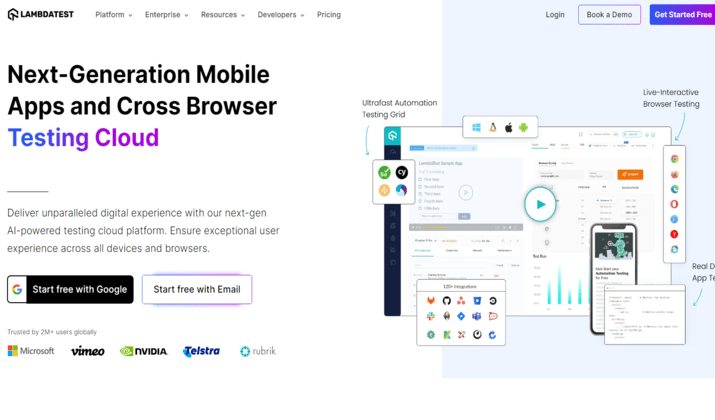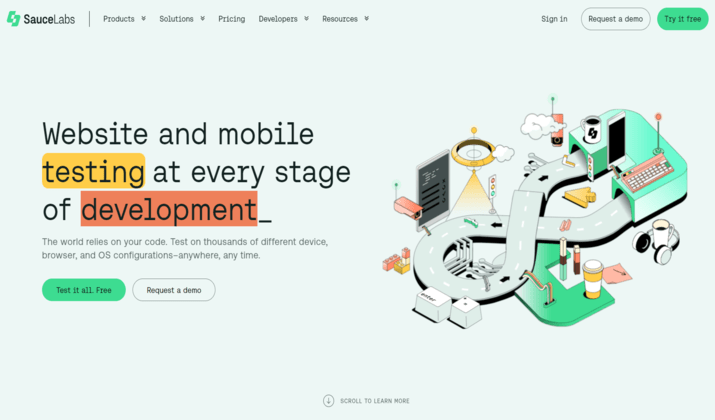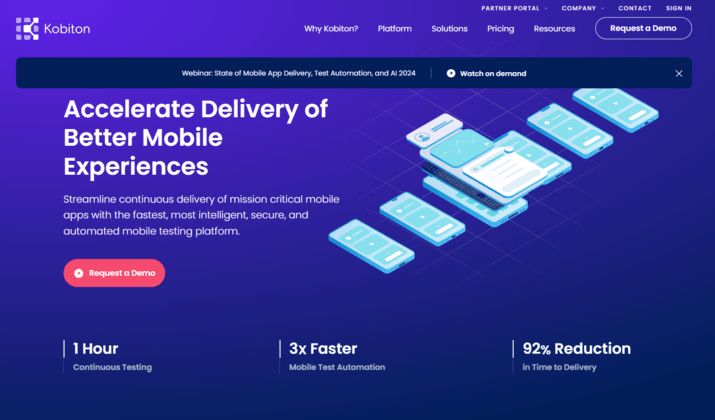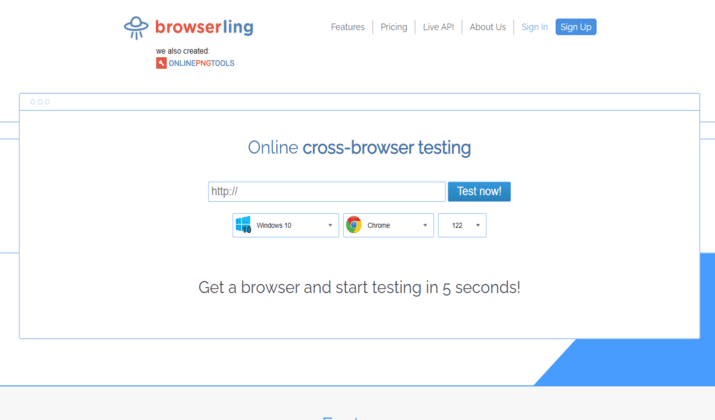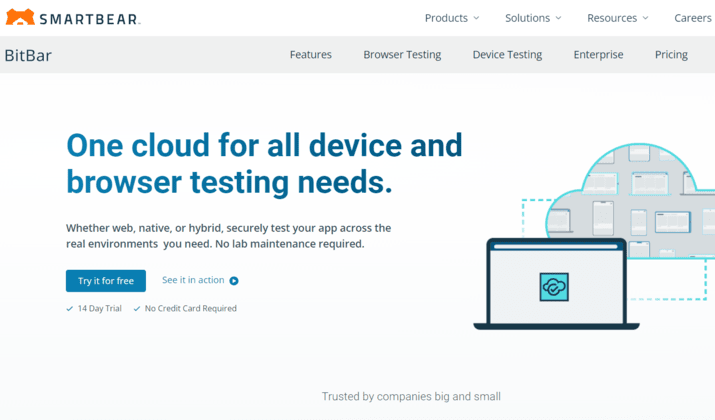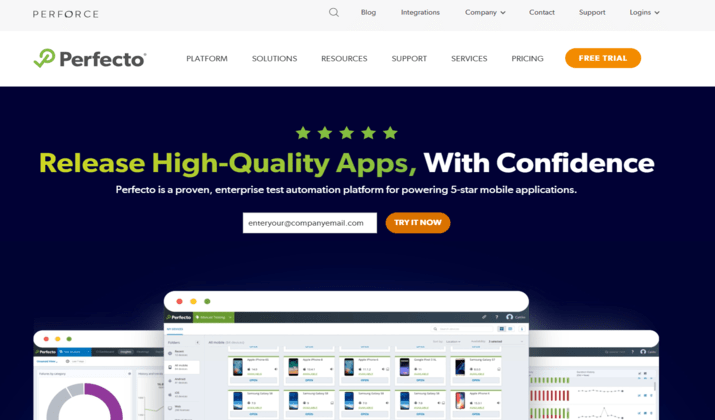Have you been using Browserstack for a while but want more when it comes to testing your web and app testing needs?
Looking for alternatives that offer better features and capabilities?
Today, we will discuss some of the best BrowserStack alternatives that provide seamless testing experience.
Not only do they provide better features than BrowserStack but some of them completely outshine BrowserStack in most areas.
Let’s find out what do we have on our list.
Best BrowserStack Alternatives
BrowserStack is a popular cloud testing vendor that offers access to a wide range of mobile devices, tablets, and browsers for testing websites and apps.
While BrowserStack is a reliable tool, it’s always good to explore other options. Here are some of the top alternatives to BrowserStack.
1. LambdaTest
LambdaTest is the best alternative to BrowserStack that offers a cloud-based testing platform. It offers a wide range of features including:
- Cross browser testing: LambdaTest supports testing on over 3,000 different browsers, devices, and operating systems, ensuring better browser coverage.
- Automation testing: It supports automation testing with popular frameworks like Selenium, Cypress, Playwright, Puppeteer, and TestCafe, allowing for faster test execution and wider test coverage.
- Mobile app testing: The platform supports testing of native mobile applications (Android and iOS) and mobile websites on real devices on the cloud or emulators/simulators.
- Real device testing: LambdaTest provides real device testing on cloud for both web and mobile applications, ensuring accurate test results.
- Visual regression testing: It offers visual regression testing, enabling users to compare the visual appearance of their web pages before and after a code change.
- Integration capabilities: The testing platform integrates with popular project management and enterprise tools like Jira, Asana, Trello, Github, Gitlab, BitBucket, Slack, and Visual Studio Team Services.
LambdaTest has received positive reviews from users, with many praising its ease of use, cost-effectiveness, and wide range of features. With LambdaTest, you can accelerate your testing process and deliver high-quality products faster.
Check out: 6 Best LambdaTest Alternatives
2. Sauce Labs
Sauce Labs is another powerful alternative to BrowserStack that provides comprehensive web and mobile app testing capabilities.
It offers a vast selection of real devices and operating systems for seamless cross-browser and cross-platform testing.
Here are some notable features and advantages of the platform:
- Functional Testing Tool: Sauce Labs is a functional testing tool that ensures flawless performance of apps and websites across various browsers, operating systems, and devices.
- Automated Testing: It allows for automated functional testing on multiple operating systems and browsers, mimicking user behavior on websites.
- Parallel Testing: Enables running tests on different operating system and browser combinations simultaneously, reducing the time to obtain results.
- Enterprise-Grade Security: Provides robust security measures to ensure data protection and reliability.
- Error Logging: Offers robust error logging capabilities, providing detailed logs to identify and resolve issues efficiently.
- Helpful Dashboards: Features informative dashboards with multiple metrics, aiding in focusing attention, issue resolution, and performance optimization.
- Agile and DevOps Integration: Aligns well with Agile and DevOps methodologies, integrating seamlessly with kickoff scripts through DevOps practices for efficient testing processes.
A cloud-based testing platform that supports over 1000 browsers, operating systems, and real devices, Sauce Labs offers manual, automated, mobile app, and security testing.
With its extensive integration options, you can easily integrate Sauce Labs into your existing testing workflows.
Read this too: LambdaTest vs Sauce Labs – Which Is Better?
3. Kobiton
Kobiton is another reliable alternative to BrowserStack that offers a seamless testing experience for both web and mobile applications.
Primarily a mobile device testing platform that supports over 500 real devices and operating systems, Kobiton offers manual and automated testing, application testing, and device lab management.
Let’s take a look at the features of this platform:
- Real Mobile Device Testing: Kobiton provides access to real iOS and Android devices for testing mobile applications under real-world conditions. Users can ensure optimal performance and user experience by testing their apps in real-world scenarios.
- Unmatched Speeds with Kobiton’s Lightning Mode: With the Kobiton’s Lightning Mode, users can launch devices in seconds, reducing wait times. With millisecond response times and a capture rate of 30 frames per second, Kobiton offers smooth testing experiences with high-quality visuals.
- AI-Driven Automation: Its AI-powered automation capabilities bridge the gap between manual and automated testing. Users can accelerate their testing processes using the platform’s no-code automation features. The AI-powered Appium script generation automates script creation and execution, enhancing manual testing.
- True Deployment Flexibility: Kobiton offers secure deployment options tailored to users’ needs. Users can access devices through the public cloud for flexibility and scalability. Dedicated devices in Kobiton’s device cloud and on-premises racks provide maximum control and security.
- Mobile Performance Testing: This platform enables users to conduct mobile performance testing to assess app performance under different conditions. Users can simulate various network conditions to evaluate responsiveness and stability. The platform provides insights into performance metrics to optimize app performance.
- Mobile Accessibility Testing: It supports mobile accessibility testing to ensure apps are accessible to users with disabilities. Users can test their apps for compliance with accessibility standards, including screen readers, keyboard navigation, and other accessibility features.
- Scriptless Test Automation: The testing platform features scriptless test automation capabilities that allow users to automate testing processes without coding. Users can create and execute automated tests using a visual interface. The platform supports various frameworks and scripting languages for seamless automation.
Kobiton is mainly designed to address the unique challenges of mobile development and testing.
The platform caters to mobile app developers, QA engineers, software testers, mobile gaming companies, and retail and eCommerce companies of all sizes.
4. TestingBot
TestingBot is a top-rated alternative to BrowserStack that offers a cloud-based testing platform for web and mobile applications. It provides a range of testing capabilities, including live testing, automated testing, and visual testing.
Here are some of its key features:
- Automated and Manual Testing: TestingBot offers both automated and manual browser testing, allowing users to run tests on over 1500 browsers, ensuring comprehensive coverage in testing sensitive designs, comparing screenshots, and sharing results.
- Multiple Test Types: The platform provides three types of tests: live websites, automation, and local tests on your computer or network, catering to different testing needs and scenarios.
- Compatibility and Integration: TestingBot is compatible with popular Test Automation Frameworks like Selenium, Appium, Cypress, Puppeteer, and Playwright, ensuring seamless integration into existing testing environments and workflows.
- Comprehensive Reporting and Analysis: Users can access detailed reports, logs, and analytics about their tests through the member area and API, facilitating in-depth analysis of test results and performance.
- Parallel Testing: TestingBot allows users to run multiple tests simultaneously, significantly reducing test run time and accelerating the testing process, enhancing efficiency and productivity.
- Cross-Browser and Cross-Device Support: The platform ensures compatibility across different browsers and devices, enabling users to test their applications comprehensively on various platforms, including desktop browsers and mobile devices.
- Secure Testing Environment: TestingBot provides a secure TestingBot Tunnel that establishes a reliable connection between the test cloud and the user’s local network, ensuring safe testing of development and staging environments.
- API Support and Integration: TestingBot offers API support, allowing users to integrate the platform into their Continuous Integration (CI) systems with plugins for Jenkins, Travis, TeamCity, and other services, enhancing automation and workflow efficiency.
With its easy-to-use interface and robust integration options, TestingBot can streamline your testing efforts and improve overall efficiency.
5. Testsigma
Testsigma is a flexible and smart testing tool that provides rapid automation and supports various testing frameworks. It is an excellent alternative to BrowserStack due to its flexibility and smart features that include:
- Project Management: Testsigma provides a unified platform for managing and tracking testing projects, enabling teams to plan, design, develop, execute, analyze, and report on their testing activities.
- Collaboration Tools: Its collaboration tools allow teams to work together on testing projects, reducing duplicate efforts and improving communication between manual and automation engineers.
- Assignment Management: The testing platform enables teams to assign tasks to specific team members, ensuring that testing responsibilities are clearly defined and managed.
- Requirements Management: Testsigma supports requirements mapping, preconditions, and reviews, making it easier to track and manage testing requirements.
- Testing/QA Management: It provides detailed test reports, including screenshots, logs, and videos, enabling teams to diagnose and fix test step failures quickly and efficiently.
- Simple English-based Test Authoring: Testsigma’s natural language processing (NLP) features allow team members to write automated tests using simple English, making it easier for testers and non-technical team members to contribute to the testing process.
Testsigma provides a unified platform for managing and tracking testing projects, enabling teams to write automated tests using simple English, and integrating with existing testing ecosystems.
6. Selenium
Selenium is an open-source software testing framework for web applications. It is widely used for automating web browsers in testing scenarios. Here are its top features:
-
- Open Source: Selenium is free to use and modify, making it an attractive choice for businesses looking to save on software testing costs.
- Multi-language support: It supports various programming languages, including Java, C#, Python, Ruby, JavaScript, and Kotlin, making it versatile for different testing environments.
- Cross-platform compatibility: The platform supports multiple operating systems, such as MS Windows, Linux, and Macintosh, allowing for testing on different platforms.
- Cross-browser compatibility: Selenium supports various browsers, including Mozilla Firefox, Google Chrome, Internet Explorer, Opera, and Safari, enabling testing on different browsers without changing the test cases.
- Parallel Test Execution: It supports parallel test execution, which can help reduce test execution time.
Besides these useful features, Selenium has some limitations too, such as the lack of reliable technical support, support for web-based applications only, difficulty in using and setting up the test environment, limited support for image testing, and potential issues with new features.
Despite these limitations, Selenium remains a popular choice for web application testing due to its open-source nature, multi-language support, and cross-platform and cross-browser compatibility.
Also read: LambdaTest vs Selenium – Which is Better?
7. Browserling
Browserling is another cloud-based testing platform that supports over 1000 browsers and operating systems. It offers manual and automated testing, mobile app testing, and visual testing. The key features of Browserling include:
- Cross-Browser Compatibility Testing: Browserling provides access to a variety of web browsers, including popular options like Chrome, Firefox, Safari, Internet Explorer, and Microsoft Edge. This allows you to verify that your web content functions correctly and looks consistent across different browsers.
- Instant Browser Access: With Browserling, you can access different browsers instantly through a web interface. There’s no need to install or configure browsers locally, saving time and resources.
- Real-Time Testing: You can interact with web pages in real-time within the Browserling environment. This is valuable for debugging, inspecting elements, and verifying functionality on different browsers.
- Cross-Platform Testing: In addition to cross-browser testing, Browserling supports testing on various operating systems, such as Windows, macOS, and Linux. This ensures that your web applications perform as expected across different platforms.
- Multiple Browser Versions: Browserling provides access to multiple versions of each browser, allowing you to test compatibility with older versions that your users may still be using.
- Developer-Friendly Tools: Browserling offers developer-friendly tools like browser extensions, screenshots, and JavaScript console access for in-depth testing and debugging.
Browserling is a convenient and efficient alternative to BrowserStack for ensuring cross-browser and cross-platform compatibility of web applications.
It simplifies the testing process and helps identify and resolve issues related to different browsers and operating systems.
8. BitBar
BitBar is a mobile device testing platform that supports over 300 real devices and operating systems. It offers manual and automated testing, app testing, and device lab management.
BitBar is a testing tool that offers features and advantages for developers and testers in various industries.
Here are some of the key features and advantages of BitBar:
- Cloud-based testing: BitBar offers a cloud-based testing platform that allows users to test applications across the latest and most popular real browsers and devices, without the need for maintaining a device lab.
- Automated testing: BitBar supports automated testing using popular frameworks like Selenium and Appium, allowing teams to scale automation speed and decrease test execution time by running automated tests in parallel across browsers and devices.
- Integration: BitBar integrates with the user’s current tech stack or CI/CD pipeline, making it easy to deploy testing from a preferred cloud environment.
- Scalability: BitBar allows users to scale testing by increasing test coverage and decreasing test execution time by running automated tests in parallel across browsers and devices.
- User-friendly interface: BitBar has a clean and user-friendly interface, making it easy for users to navigate and use the tool.
9. Perfecto
Perfecto is a mobile app functional and performance testing, and automation testing tool offered by Perforce. It is designed to maintain and manage devices in the cloud.
Some of the key features of Perfecto include:
-
- Cloud-based testing: Perfecto allows for cloud-based testing. This enables organizations to maintain devices in the cloud and manage/maintain devices, which saves time and money.
- Device compatibility: It supports a wide range of devices, including mobile and web applications. It provides a scalable solution for the cloud.
- Integration: This platform integrates smoothly into existing processes and provides a tool that can be used interactively as well as for automation.
- Customer support: Perfecto offers excellent customer support. It is committed to providing the right technology, support, training, and guidance to help clients succeed.
- Codeless automation: It provides codeless automation, which allows for easier maintenance and automation testing.
- Real user simulation: This testing option offers real user simulation. This allows for better tracking history of activities and the storage of larger sets of data..
Perfecto is used by organizations for mobile testing, user experience, and automation testing. It is used by multiple departments and helps in automation and easier maintenance by having devices in cloud.
Another related read: Perfecto vs LambdaTest – Which Is Better?
10. Applitools
Applitools is a cloud-based testing alternative to BrowserStack that supports over 1000 browsers and operating systems. It offers manual, automated, mobile app, and visual testing
Here are the features of Applitools:
- AI-powered visual testing: Applitools uses advanced artificial intelligence and machine learning algorithms to detect defects in complex and dynamic web and mobile applications. This allows for more accurate and efficient visual testing, which can identify even the most subtle defects.
- Cross-browser and cross-device testing: It allows for easy testing of applications across multiple browsers, devices, and resolutions. This saves time and effort and ensures that applications work correctly for all users.
- Integration with popular testing frameworks: The platform integrates seamlessly with popular testing frameworks such as Cypress, and Appium. This makes it easy for teams to integrate visual testing into their existing workflows and processes.
- Improved testing efficiency: With Applitools, teams can automate visual testing and identify defects quickly and accurately. This saves time and effort and allows teams to focus on other essential aspects of software development.
- Better user experiences: By identifying and resolving visual defects, Applitools helps to ensure that applications function correctly and provide a positive user experience. This can lead to increased customer satisfaction and loyalty.
- Collaboration and reporting: Applitools provides tools that allow teams to share test results, track progress, and collaborate on visual testing. This helps to improve communication and collaboration within teams and across departments.
These features and advantages make Applitools an ideal choice for teams prioritizing quality, efficiency, and user experience in software development.
However, it is important to note that Applitools can be more expensive than some of the other testing tools. Users also find its learning curve a bit longer.
Conclusion
So these are some of the best BrowserStack alternatives that provide a range of options for seamless web and mobile app testing. They offer affordability, compatibility, and specific functionalities to meet your diverse testing needs.
When choosing the best alternative for your testing needs, consider your requirements and compare the tools closely around their features and the benefits they offer.
Whether you’re a small-scale company or an individual developer, there is an alternative that can suit your needs.
In our book, LambdaTest tops the list. Not only is it feature-rich but delivers top-notch performance every time.

